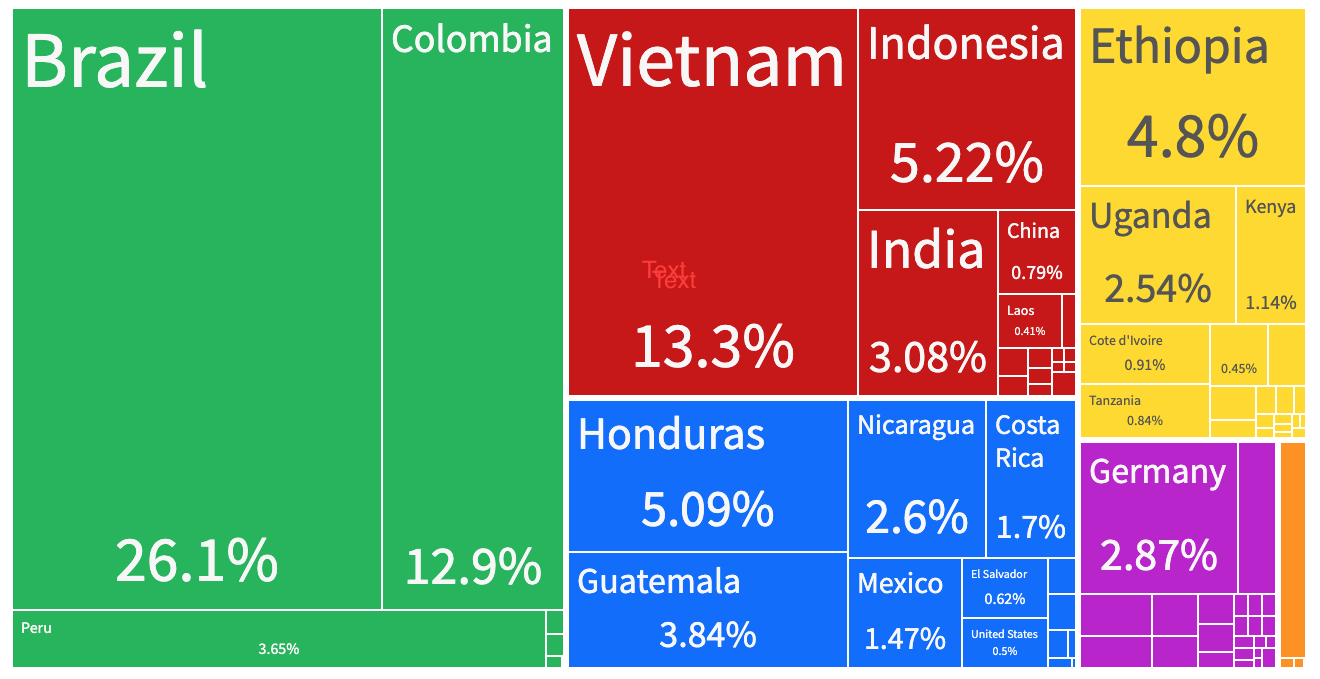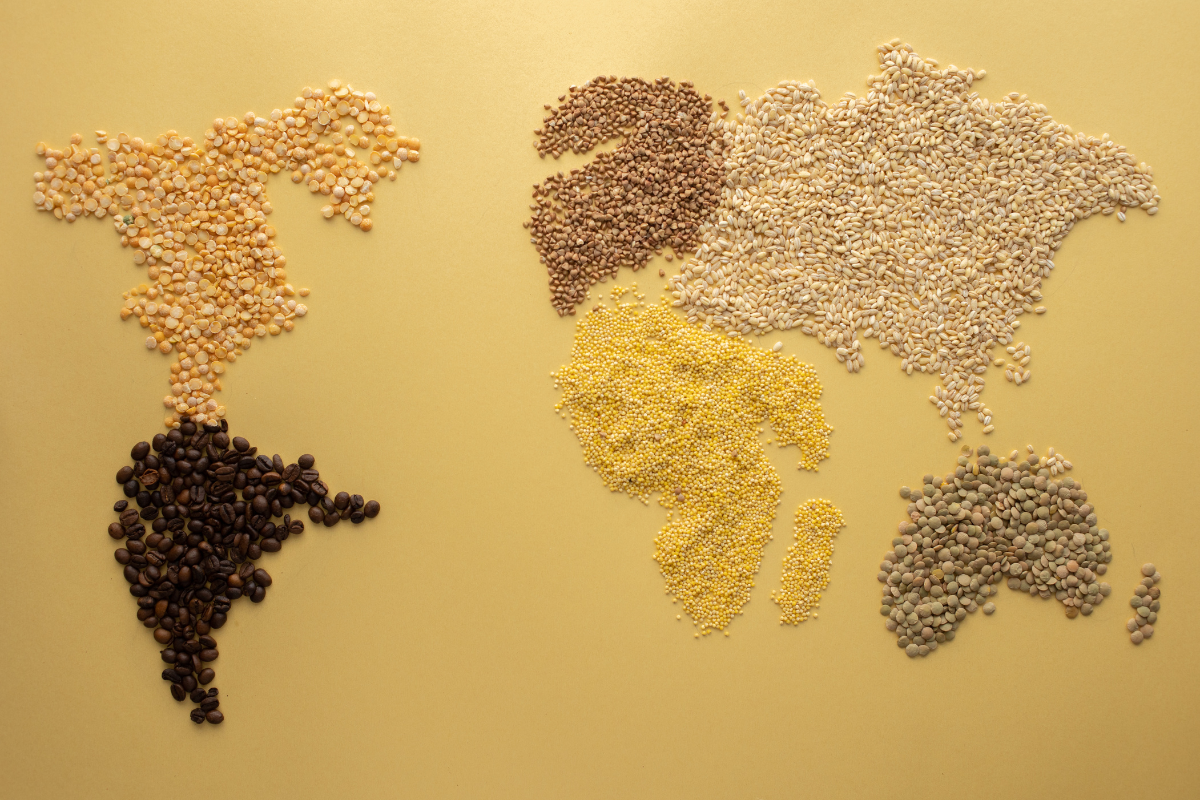As a coffee bean ethusiast, it is fascinating to explore the origins of Arabica coffee beans and the unique flavors they bring to the cup. Arabica, the most widely consumed and esteemed coffee species, thrives in various countries worldwide, each with its distinct growing conditions and flavor profiles. Join us on a journey to discover where Arabica coffee beans are grown and the specialties they offer.
Origins and Specialties of Arabica Beans

1) Ethiopia: The Birthplace of Arabica Coffee
Ethiopia holds the distinction of being the birthplace of coffee. Arabica coffee beans originated in the lush forests of this East African nation. Ethiopian Arabica is renowned for its vibrant acidity, complex fruity flavors, and floral aromas. Varieties such as Sidamo, Yirgacheffe, and Harrar showcase the country's rich coffee heritage, making Ethiopia a pilgrimage site for coffee enthusiasts seeking exceptional quality and diverse taste experiences.
2) Brazil: The Land of Vast Plantations
Brazil, the world's largest producer of Arabica coffee, boasts sprawling plantations that stretch across its diverse landscapes. Brazilian Arabica beans, including the Brazil Santos and Brazil Cerrado beans are known for their smooth, medium-bodied profile, offering flavors ranging from nutty and chocolaty to caramel-like sweetness. The regions of Minas Gerais, São Paulo, and Espírito Santo produce high-quality Arabica beans, forming the backbone of many popular coffee blends enjoyed worldwide.
3) Colombia: The Iconic Coffee Producer
Colombia's reputation as a specialty coffee producer stems from its high-altitude regions and meticulous farming practices. Colombian Arabica is celebrated for its well-balanced acidity, medium body, and notable sweetness. The diverse microclimates of regions such as Antioquia, Huila, and Nariño contribute to the distinct flavor profiles found in Colombian Arabica, which often feature notes of bright citrus, caramel, and chocolate.
4) Costa Rica: Pioneers of Sustainable Coffee
Costa Rica has gained recognition for its commitment to sustainable coffee production and high-quality Arabica beans. The volcanic soils and favorable climates of regions like Tarrazú, Tres Rios, and Dota Valley produce Arabica coffee with bright acidity, medium body, and a complex flavor spectrum. Costa Rican Arabica is often characterized by vibrant citrus notes, floral undertones, and hints of cocoa, making it a favorite among discerning coffee aficionados.
5) Kenya: Boldness and Brightness in Every Cup
Kenyan Arabica stands out for its bold acidity, full body, and intricate flavor profiles. Grown in high-altitude regions such as Nyeri, Kirinyaga, and Murang'a, Kenyan Arabica beans offer vibrant acidity, wine-like complexity, and a range of fruit-forward flavors like blackcurrant, red berries, and citrus. Known for its stringent grading system, Kenya maintains a reputation for consistently producing some of the finest Arabica coffees in the world.
6) Guatemala: Diversity and Elegance in the Cup
Guatemala's diverse microclimates, volcanic soils, and traditional cultivation methods contribute to its reputation as a producer of exceptional Arabica coffee. The regions of Antigua, Huehuetenango, and Cobán showcase Guatemalan Arabica's well-rounded acidity, medium body, and nuanced flavors. These can include notes of cocoa, floral tones, stone fruits, and even hints of spices, offering a delightful range of taste experiences.

In Conclusion: Embracing Regional Specialties of Arabica Coffee
Arabica coffee beans, with their diverse origins and specialties, captivate coffee lovers worldwide. From Ethiopia's vibrant and complex flavors to Brazil's smooth and nutty profiles, each country leaves its mark on the Arabica coffee landscape. Whether you're savoring the bright acidity of Colombian coffee, the boldness of Kenyan brews, or the elegance of Guatemalan cups, exploring the unique characteristics of Arabica beans from different regions adds depth and excitement to the coffee experience.As coffee bean consumers, understanding the origins and specialties of Arabica coffee beans allows us to appreciate the immense effort and expertise invested in producing exceptional coffees. So, the next time you enjoy a cup of Arabica coffee, take a moment to relish the flavors that have traveled from the diverse landscapes of Ethiopia, Brazil, Colombia, Costa Rica, Kenya, Guatemala, and beyond, enriching your coffee journey with their distinctiveness and charm.

